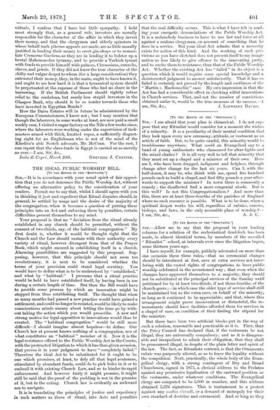THE IDEAL PUBLIC WORSHIP BILL.
[To THE EDITOR OF THE "SPECTATOR."] SIR,—It is in accordance with your usual spirit of fair opposi- tion that you do not denounce the Public Worship Act, without offering an alternative policy to the consideration of your readers. Permit me to say that, whilst I should agree with you in thinking it just and expedient that Ritual disputes should, in general, be settled by usage and the desire of the majority of the congregation, when it becomes a question of putting these principles into an Act and enforcing them by penalties, certain difficulties present themselves to my mind.
Your proposal is that no "deviation from the ritual already established in any church should be permitted, without the -consent of two-thirds, say, of the habitual congregation." My first doubt is, whether it would be thought right that the Church and the Law should sustain with their authority every -variety of ritual, however divergent from that of the Prayer Book, which might succeed in establishing itself in a church. Alarming possibilities are suggested by this proposal. Sup- posing, however, that this principle should not seem too revolutionary, it is next to be considered whether the terms of your provision could stand legal scrutiny. You would have to define what is to be understood by "established," :and what by habitual." I presume that a ritual practice would be held to have established itself, by having been in use during a certain length of time. But then the Bill would have to provide some process by which an innovation might be stopped from thus establishing itself. The thought that when so many months had passed a new practice would have gained a settlement, and could no longer be resisted, would be likely to make conscientious minds uneasy about letting the time go by with- out taking the action which you would prescribe. A new and strong motive for legal opposition to innovations would thus be 'created. The "habitual congregation" would be still more difficult—I should imagine almost hopeless—to define. Our Church law at present knows nothing of a congregation, nor of what constitutes an " habitual " member of it. Now it is the legal resistance offered to the Public Worship Act in the Courts, with the protracted litigation to which it has thus given occasion, that proves it in your judgment to have "completely failed." Therefore the ideal Act to be substituted for it ought to be one which promises, at least, to defy all that legal acuteness, stimulated by abundant funds, could do to pick holes in it or to embroil it with existing Church Law, and so to hinder its rapid enforcement. And however fairly it might promise, it might still be said that the proof of the pudding is not in the promise of it, but in the eating. Church law is evidently an awkward sea to navigate.
It is in translating the principles of justice and expediency in such matters as those of ritual, into Acts and penalties
that the real difficulty occurs. This is what I have felt in read- ing your energetic denunciations of the Public Worship Act. It is a melancholy business to have to use law and force at all against a zealous clergyman, on account of something that he does in a service. But your ideal Act admits that a necessity exists for action of this kind. And the working of such pro- visions as you have sketched does not present itself to my imagi- nation as less likely to give offence to the innovating party, and to excite them to resistance, than that of the Public Worship Act. Whether the existing Act has " failed " in its object is a question which it would require some special knowledge and a disinterested judgment to answer satisfactorily. That it has so failed is certainly not proved by the length and costliness of the "Martin v. Mackonochie" case. My own impression is that the Act has had a considerable effect in checking wilful innovations in Church services. That, and not the number of convictions obtained under it, would be the true measure of its success.—I


































 Previous page
Previous page